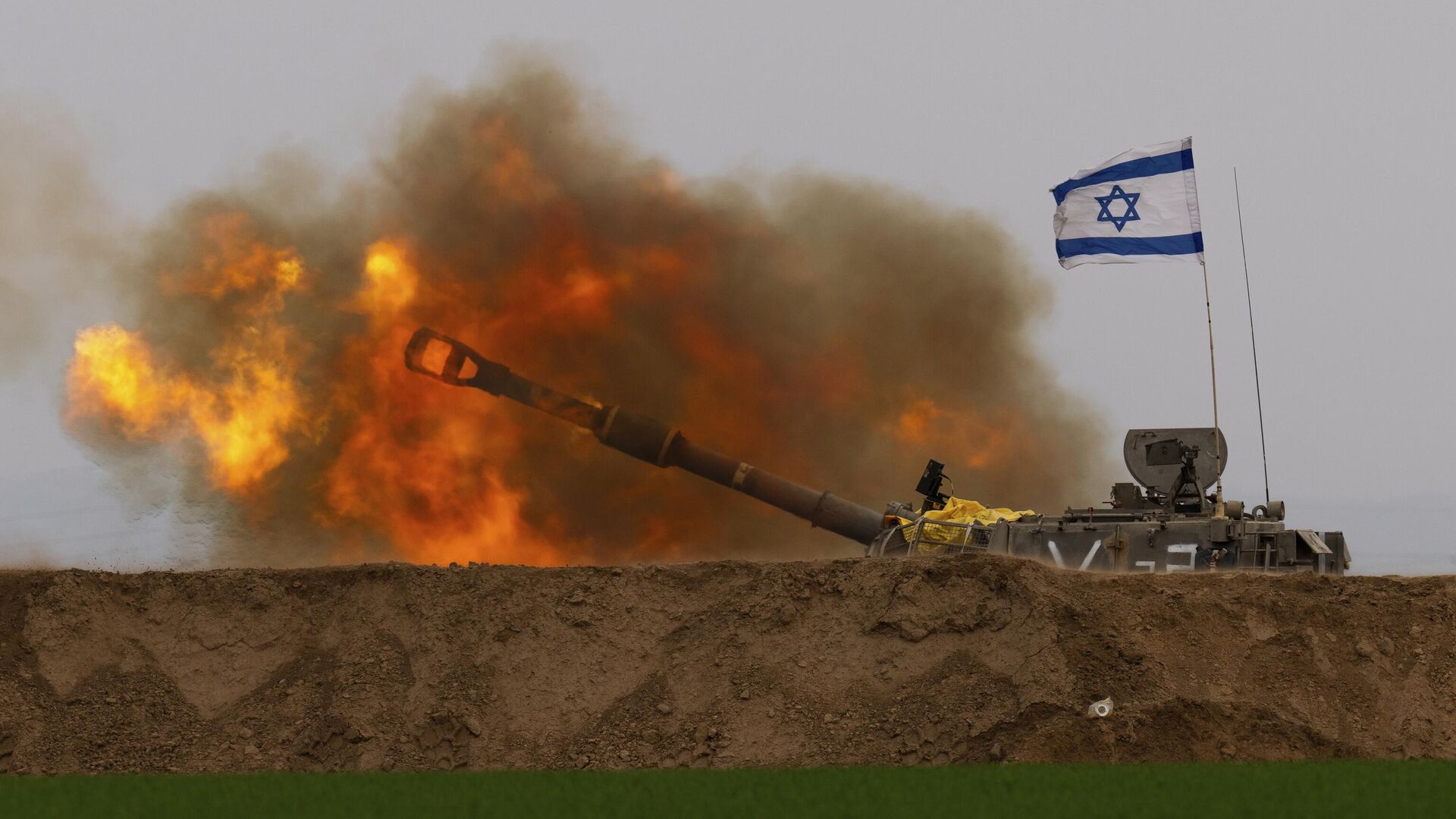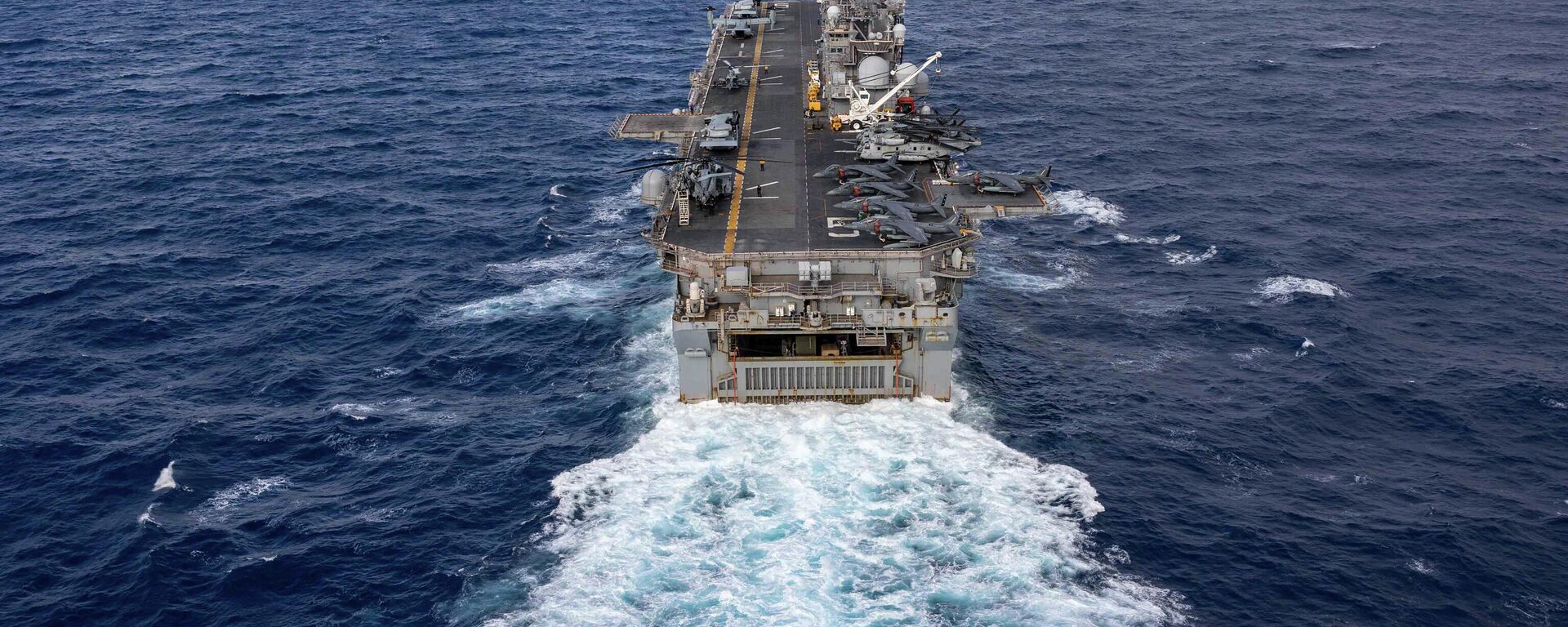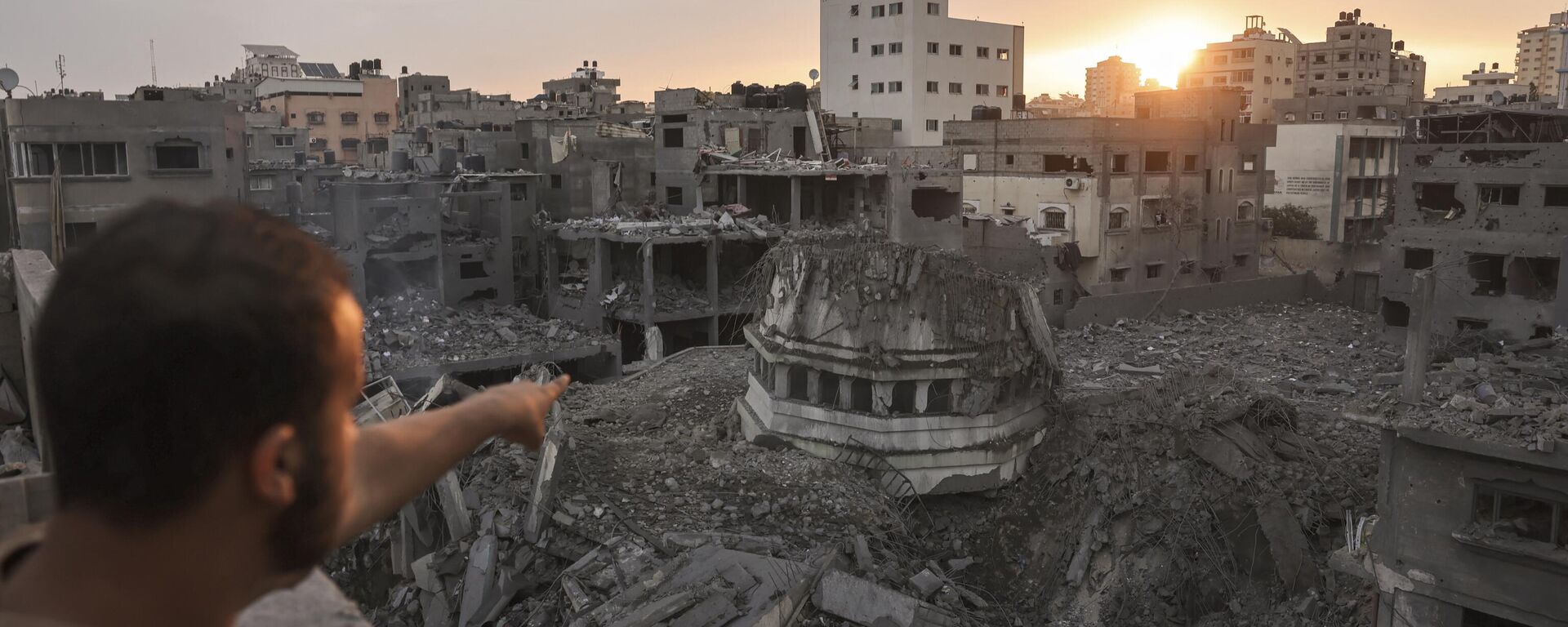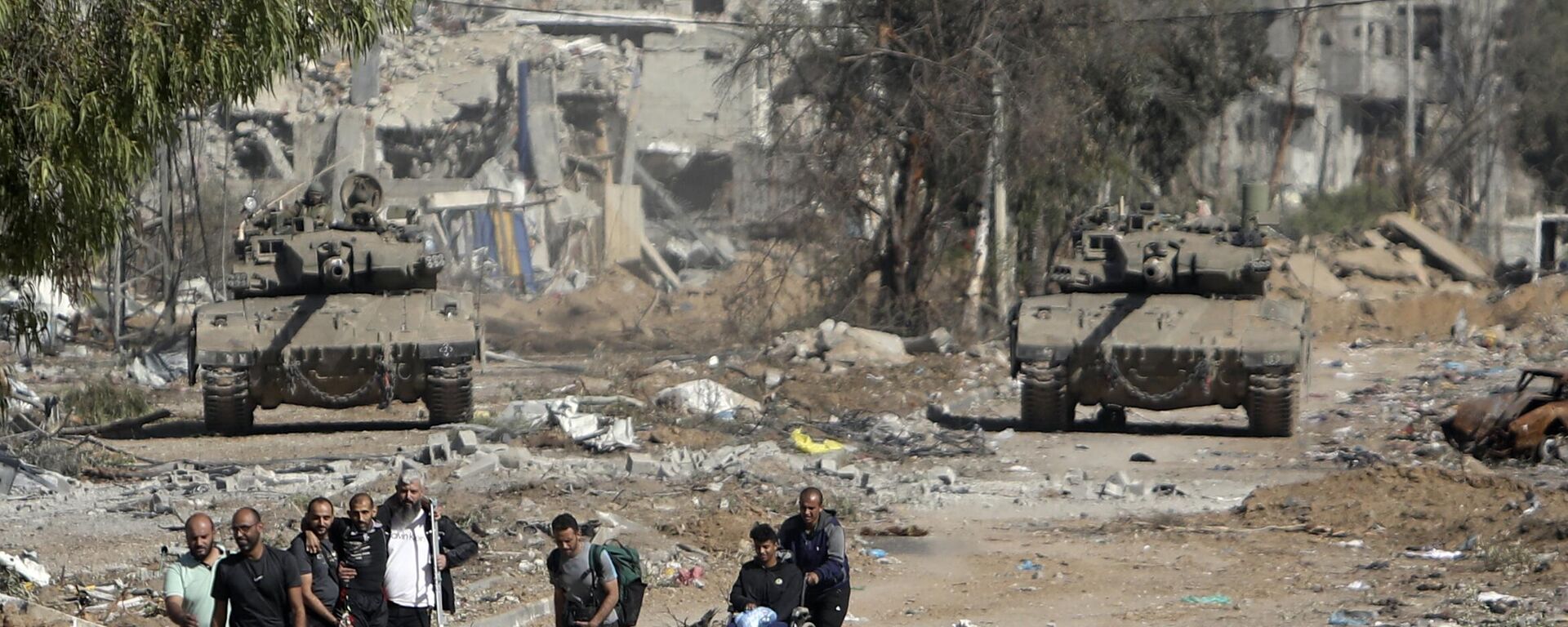Multi-Arena War: What Does the Future Hold in Store for Israel-Palestine Conflict?
15:10 GMT 26.12.2023 (Updated: 10:25 GMT 29.12.2023)

© AP Photo / Ohad Zwigenberg
Subscribe
The standoff has already morphed into a multi-front war between Tel Aviv and participants of the so-called Axis of Resistance. Will next year be marked by an all-out war in the Middle East?
Israeli Defense Minister Yoav Gallant stated that Israel has been fighting a war on seven different fronts on December 26.
"We are in a multi-arena war, we are being attacked from seven different sectors - Gaza, Lebanon, Syria, Israel, Iraq, Yemen and Iran," Gallant highlighted at the Foreign Affairs and Defense Committee meeting on Tuesday, as quoted by the Jerusalem Post.
The minister warned that anyone who acts against Israel is a "potential target", adding that "this is a long, hard war", but "its justification is the highest it can be." The hostilities began after Palestinian Islamist group Hamas conducted a surprise attack on Israeli civilians and military, killing over 1,200, and taking around 240 hostage on October 7.
"Hamas is part of the Resistance Axis (…) that is led by Iran," Professor Efraim Inbar, president of the Jerusalem Institute for Strategy and Security, told Sputnik. "We already see a multi-front war against Israel which was started of course by Hamas but was joined by Hezbollah and also by the Houthis in Yemen. And we also see activities of Iranian-led militias, Shiite militias in Syria and also in Iraq, all of them participating in a war against Israel."
The Israel Defense Forces (IDF) are continuing to dismantle Hamas positions in the north of the Gaza Strip. As per the Israeli press, the IDF inflicted serious damage on several Hamas battalions; miles of Hamas underground tunnels have been destroyed; and the Israeli military has expanded its operations in both central Gaza and Khan Younis to the south.
Nonetheless, the Palestinian Islamist group has remained largely intact in the south, with Hamas leader in Gaza Yahya Sinwar claiming on Monday that the organization would never agree to Tel Aviv's "conditions" and would continue to fight. The Israeli military has warned that the war would be a protracted one, as per the Jewish media.
Meanwhile, Hezbollah is continuing to attack Israel from the north, while the Houthis, a Yemeni Shiite group, has opened a second front in the Red Sea and announced that 20,000 reservist soldiers could be possibly deployed to the Gaza Strip to help Hamas, as per Yemeni news agency Saba.
Will the Gaza War Spill Over?
"It's not clear yet if the conflict in Gaza will escalate," Inbar said. "It remains to be seen after Israel achieves its goal in destroying the Hamas military capabilities in Gaza. What will happen? It's not dependent that much on Israel. If Hezbollah will continue to shoot at Israeli civilians, if the Houthis will continue [to attack]. Then, of course, we may see an escalation of the conflict. Israel is not going to sit quiet and take this type of hostile activity."
Inbar believes there isn't much chance "of seeing a peaceful solution in the near future."
"We [Israel] have military goals, we have to win a war and whatever it takes," the professor said. "Israeli society has recently displayed tremendous unity, tremendous fighting spirit. And we understand that in order to survive in the Middle East, you have to be strong and win the war."
Given the number of various forces being involved in the Gaza war, the conflict is growing risky, according to Ayman Yousef, professor of political sciences and international relations at the Arab-American University in Palestine.
The US has beefed up its military presence in the region dramatically with additional naval, air and land forces being deployed in the Middle East. What's more, in response to the Houthi's attacks on Israeli-linked vessels in the Red Sea, the Pentagon announced a ten-nation coalition to safeguard trade in the region and dispatched further forces there.
For its part, Iran has warned the US and its allies in the Red Sea that they should prepare for the closure of waterways stretching all the way to the western gates of the Mediterranean Sea.
"[The conflict] might spill over to the region," Yousef told Sputnik. "If Israel continues to kill Palestinians in this indiscriminate way, in this inhuman way, kind of genocide and even more to the extent of a genocide and massacring people in Gaza, that might ignite, spark a kind of a new regional configuration and new regional forces. Hezbollah in Lebanon, al-Houthi in Yemen and many Shia armed groups in Syria and Iraq, all of them are angry at what Israel is doing. I think then the conflict might spill over to the region."
Netanyahu's Three Prerequisites for Israeli-Palestinian Peace
Israeli Prime Minister Benjamin Netanyahu has made it clear that before any peaceful settlement between the Israelis and Palestinians is achieved, "Hamas must be destroyed, Gaza must be demilitarized, and Palestinian society must be de-radicalized."
Netanyahu outlined his vision in an op-ed for the Wall Street Journal on Monday. The Israeli premier subjected the Palestinian Authority (PA) to criticism, stressing that the body is unfit to rule the Gaza Strip after Hamas is destroyed.
"There are certain things that are dependent upon Israel," said Inbar. "Destroying Hamas' military capabilities is dependent upon us. We can try to impose demilitarization of Gaza. Although, you know, this type of goal is problematic because there are always ways to smuggle weapons into Gaza. And of course, the motivation to fight Israel is there. And to change the education system [to de-radicalize Palestinians] is not dependent on Israel. It has to be a Palestinian decision."
The Israel media has drawn attention to the fact that Netanyahu avoided mentioning the future of the Palestinian state or a two-state solution in his op-ed. The Israeli prime minister is said not to support a two-state scenario. Likewise, Hamas does not seek a two-state solution either, with Palestinians finding themselves between a rock and a hard place.
The Israeli premier appears to be determined to continue the fight no matter what. While the number of those killed in Gaza is estimated to be over 20,000, Netanyahu insisted in his op-ed that "Israel does its best to minimize civilian casualties."
Meanwhile, judging from national polls, Netanyahu is losing popularity, with the majority of voters saying that he should step down when the Gaza war is over.
"Israel failed miserably with its right[-wing] Likud elite, (…) and the lack of vision and mission for the current Israeli government," suggested Yousef. "Israel with its right[-wing] government is really harming itself. So this could be another factor that might motivate the rise of a new government, the rise of new elites, then the rise of new scenarios inside the Israeli political system that push forward a kind of settlement, peaceful and political settlement."
Is the US Getting Tired of Israel's War in Gaza?
Haaretz, an Israeli left-leaning publication, argues that "Israel is increasingly seen as a liability in the US." Indeed, a December poll from Quinnipiac University indicated that 46% of voters oppose further US military aid to Israel.
At the same time, the latest Fox News survey showed that a whopping 74% of respondents are concerned about the Israel-Hamas war, meaning that the region still remains in the focus of Americans.
"I think the US is tired of its continued support of Israel," Yousef said. "And this might go in favor of resolving the conflict. But at the same time, there are factors that hinder this kind of resolution at this time. Number one is the Israeli tendency to war. Although Israel is losing the battle in Gaza and there are huge losses in the Israeli army, still Israel has this tendency to go for war and resolve conflicts by military means and military ways."
"The second factor is the continuation of the Palestinian split, the political fragmentation between Fatah and Hamas, and lack of progress in this direction. And the third factor is normalization of Arab countries with Israel. If Israel is normalizing with Arab countries, it has to agree or it has to go in the direction of making and building peace with the Palestinians," the political scientist continued.
US No Longer Seen as Trustworthy Peace-Broker
Meanwhile, neither Inbar nor Yousef sees the United States as a powerful peace broker that could find a way out of the conflict in the near future.
"I think that we should not exaggerate the power of the United States in mediating the conflict in the Middle East," Inbar said. "If we remember, the peace between Israel and Egypt was the result of an Egyptian initiative. Similarly, the Oslo process in the nineties was started by bilateral negotiations between Israelis and Palestinians, and only afterwards the Americans came in."
If one wants to find a real solution to the Palestinian-Israeli conflict, new international forces are needed to come in and take the lead, according to Yousef.
"This does not mean that the US will not have a key role," the political scientist said. "It has a key role. But there are some other countries that must come in to share this role. We need a kind of a multilateral umbrella rather than a unilateral umbrella. New forces must come and play a crucial role along with the US - the Russians, the Chinese, the French, the Germans, the British, whoever can really lead this initiative in the Middle East, and even a greater role for the UN and some other regional groups and regional and international organizations. Because this war, this genocide imposed over Gaza, has proved that the US is not at all an objective and honest broker between the Palestinians and the Israelis."




